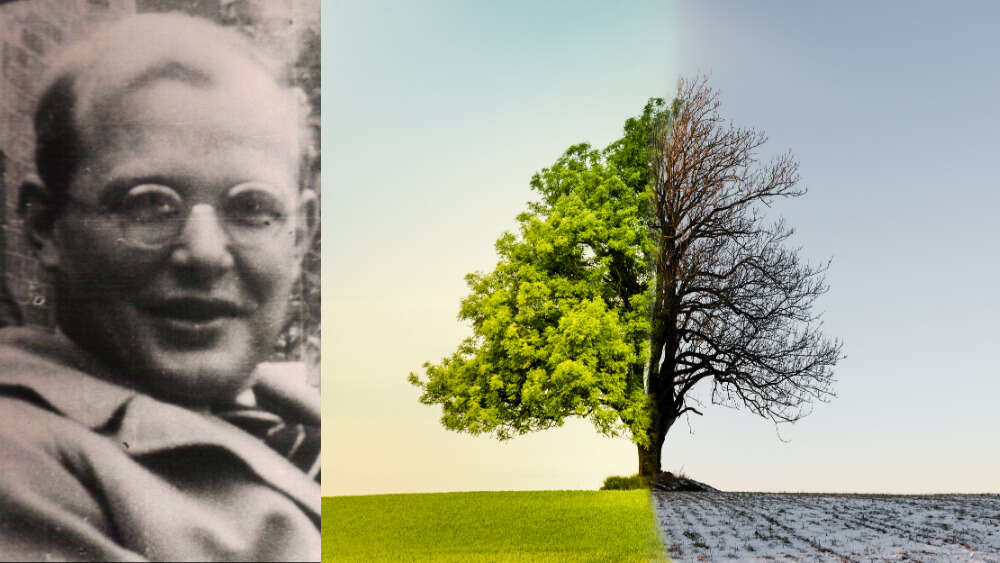Bonhoeffer's ‘Religionless Christianity’ and Christian responsibility
This is the third part in Eternity’s interview with Dr Di Rayson. Click here to read Part 1: ‘What would Bonhoeffer do?’ is the wrong question and Part 2: Bonhoeffer and Gandhi.
Dietrich Bonhoeffer talked about “religionless Christianity” – Christianity where the form of religion became more important than the actual faith of Christians, Dr Dianne Rayson says.
'What would Bonhoeffer do?' is the wrong question
Bonhoeffer and Gandhi
“He’s talking about the ‘externalities’ – particularly in the context of the German church who are going through the motions of upholding Christianity and yet they’re siding with Hitler,” she explains.
“He’s saying: ‘These things can’t go together.’”
Rayson also thinks Bonhoeffer’s discussion of religionless Christianity is “projecting ahead” to a future time.
“He was already in prison when he starts using that term,” she explains. “I think he’s projecting ahead to imagining how Europe can be restored after the Holocaust, and how religion is no longer going to have the same authority that it has had because of the Holocaust.”
Rayson believes that, at the time of writing, Bonhoeffer realised that people aren’t going to trust institutions in the same way they have before the Holocaust.
“The church is not going to be the centre of the community,” she says, explaining what Bonhoeffer’s mindset appeared to be. “We need to be able to preach the word of God, and draw people into the love and reconciliation of God, without assuming the Christian religion is a priority, or an assumption that everyone has, or is amenable to.”
“How are we going to preach that in a new age where this assumption no longer holds true?”
“What a Bonhoefferian ethic really drives at is the concept of ‘our responsibility’”
The relevance of Bonhoeffer’s thinking to Christians living in 2021 is striking.
“So Bonhoeffer’s ‘religionless Christianity’ is getting to the heart or the core of what the message of reconciliation is, regardless of external institutional trappings, and whether they exist or not.”
So what does Bonhoeffer suggest Christians do in a new age where adherence to Christian teachings can neither be assumed nor respected?
“What a Bonhoefferian ethic really drives at is the concept of ‘our responsibility’,” Rayson says.
“What is the responsible action to take in a crisis? Maybe a crisis drives you to behave in slightly different ways to just business as usual. That’s what Bonhoeffer was faced with in the Second World War –seemingly, the only way to speed up the end of the war and to stop the killing, was to remove Hitler and petition for peace,” she says.
“In normal circumstances, you wouldn’t consider removing the leader of a nation. But this was an exceptional circumstance, so they were forced to consider what the appropriate action to take was in those extreme circumstances.”
“How are we going to preach that in a new age where this assumption no longer holds true?”
Taking exceptional action in exceptional circumstances
Though the “extreme circumstances” of Hitler’s murderous reign led Bonhoeffer to advocate for “an exceptional use of violence to address the exceptional crisis of his times”, Rayson notes that it was really “for the sake of peace and nonviolence” that he was even considering such things.
And it is here that Bonhoeffer’s approach inspires Rayson as an eco-theologian.
The problem of climate change that humanity is facing today, she notes, is another “exceptional circumstance” where it is not possible to just continue along with business as usual.
“The violence that currently exists – and is going to continue to grow – is the extinction of species that is caused by human behaviour,” she explains.
“We are not talking about the natural life and death cycle of creatures – of individual creatures. We’re talking about the complete obliteration of species created by God for us to tend and care for. As if that is not the greatest moral outrage ever!”
And, of course, the impact of climate change is also being experienced directly by humans.
“The impact on fellow humans – people losing their homes, people being driven out of areas of great conflict, the famines that we’ve seen in the Middle East driving social unrest and then driving mass migration – these global issues are connected. They all have a root in biodiversity loss and climate change,” Rayson says.
And a Bonhofferian approach to the exceptional crisis of climate change, Rayson explains, makes it the church’s responsibility – as the community who has most experienced the reconciliation of God – to drive the exceptional action that’s required to address it.
Email This Story
Why not send this to a friend?



